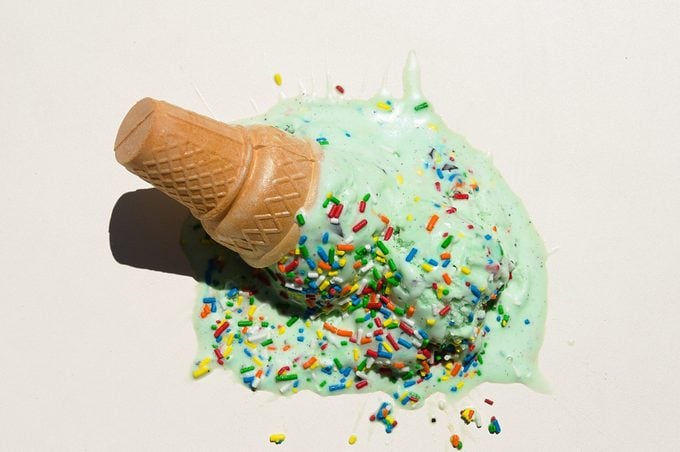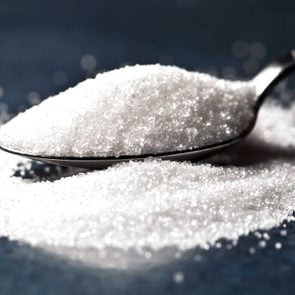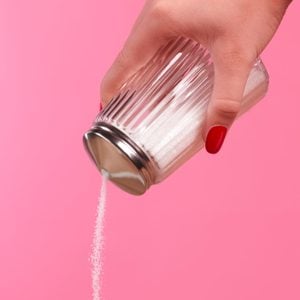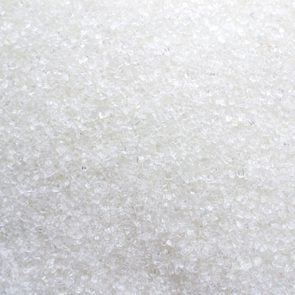Dental Health Experts Think You Should Finally Dismiss These 13 Sweet Tooth Beliefs
Updated: Jul. 20, 2023
"You're not crazy if you think you have a sweet tooth," a dentistry professor says. "We have some scientific evidence that it's true."

Ever feel like a slave to sugar? There’s a good reason people are attracted to cookies, candy, ice cream, chocolate, cake, and other tasty treats.
Why we love sweets
From the time we’re born, we are hard-wired to seek out sweet foods for survival—human breast milk has 17 grams of sugar per serving—and as we grow we learn to associate sugar with comfort, says Erin Issac, DMD, a board-certified pediatric dentist in Pennsylvania.
Eating too much sugar can make you sick, but when you eat it in moderation, sugar offers real mental and physical health benefits. Sugar is a carbohydrate and a quick source of energy for your brain and body. It can also feel soothing and temporarily lower stress levels. (There’s a reason so many “comfort foods” are sweet, Dr. Issac says.)
Yet we all know some people who seem to crave sweets more than others, even claiming to have a “sweet tooth.”
Fact: The sweet tooth is real
There is no such thing as a physical tooth in your mouth that goes rogue and causes you to inhale bags of chocolate. Still, there is evidence that some people have genetic, hormonal, and mental factors that make them crave sugar more than others, says Wesam Shafee, DMD, a dentist practicing in New Jersey and a Clinical Associate Professor of Restorative Dentistry at the University Of Pennsylvania School Of Dental Medicine.
“You’re not crazy if you think you have a sweet tooth,” he says. “We have some scientific evidence that it’s true.”
Dr. Issac and Dr. Shafee share with The Healthy the scoop on your sugar cravings, busting long-held legends about what it means to have a sweet tooth.
“Your sweet tooth is all in your mind.”
Ever notice it seems like there are two classes of people when it comes to dessert—those who absolutely love it, and those who aren’t sweets eaters? According to a 2018 study published in Cell Reports, the FGF21 gene produces a hormone that can make you more sensitive to insulin fluctuations. This, in turn, makes you seek out sugar more than people without the gene. You can, however, use your mind to help you conquer those sugar cravings.
“You can tell if someone has a sweet tooth by looking at them.”
Eating too much sugar is one of the top factors associated with obesity, but just because an individual is heavy doesn’t automatically mean they’re consuming excessive sugar. In fact, researchers found that people with the sweet tooth gene were more likely to have lower body fat (although they were also more likely to have high blood pressure).
“Sugar-free foods and drinks are safe for teeth.”
No, they’re not. Sugar-free products are often touted as a healthier alternative, but researchers from Melbourne University tested a variety of sugar-free soft drinks, sports drinks, and sweets and found that they were highly acidic. “Any food which makes the mouth more acidic can lead to cavities and tooth enamel erosion,” Dr. Shafee explains.
“All sugar is sweet.”
Think that just because you crave pasta, bread, and barbecue instead of candy that you don’t have a sweet tooth? Not so fast: There is plenty of sugar hidden in many savory treats, too.
Sugar is a carbohydrate and is found in any carb-laden food, even if it doesn’t taste “sweet.” “Anything that can break down into sugar—and that includes snacks like Goldfish [crackers] and pretzels—can increase cavity and acid erosion risk on the teeth,” says Dr. Issacs.
“Candy and sweets are the worst foods for your teeth.”

There are plenty of foods that are worse for your teeth than sugar. Sweets in liquid form, like juices, soda, and milk, coat every nook, cranny, and groove of your teeth, making them the worst offender for dental health, says Dr. Issac. She echoes Dr. Shafee’s point, noting that the combination of sugar and acid found in many soft drinks make them doubly bad for teeth.
“You should brush your teeth immediately after eating sweets.”
Actually, you might consider brushing before eating sweets. “It seems counterintuitive, but the pH in our mouth changes every time we eat, which puts our teeth in a weakened state. So if you brush right after eating, you’re literally scrubbing that acid into your teeth,” says Dr. Issac. “Brush before with a fluoride toothpaste, so that over time, enamel is strengthened and can better withstand the sweets.”
“You can’t control your sweet tooth.”
“This notion of not being able to control sweet cravings because of a ‘sweet tooth’ can definitely be harmful,” says Dr. Issac. Too much sugar increases your risk of cavities, diabetes, and heart disease. So even if you do get powerful cravings, there are plenty of reasons to reel it in. (Read Cardiologists Just Cleared Up 7 Common—but Inaccurate—Beliefs about Heart Disease.)
“Fruit snacks are a better choice than chocolate.”
The fruit snacks that come in single packs are one of the worst offenders for teeth, especially as they’re often given to children as a “healthy” treat, says Dr. Shaffee. From a dental perspective, the sticky sweet foods—think gummies and toffees—are harmful to the teeth because they cling to the surface.
“Sugar-free gum is good for your teeth.”
The artificial sweetener xylitol has been shown to decrease cavity risk. Some popular gums, like Trident, have it as their main ingredient, says Dr. Issac. Chewing xylitol gum may have a small benefit. However, many sugar-free gums use other sweeteners that don’t help and may harm your teeth.
“Adults suffer from a sweet tooth more than children do.”
It might seem natural to think that—because baby teeth will be replaced by adult teeth—kids tend to crave sugar more and suffer worse effects from eating it than adults. The truth is, baby teeth have thinner enamel, and their tooth nerves are large. This means that dental decay can develop more quickly and progress all the way to the nerve much quicker than in adult teeth, says Dr. Issac.
“Lemonade is a healthier way to indulge your sweet tooth than soda.”
Sweetened beverages aren’t good for your waistline or oral health, but that isn’t limited to sodas. Drinks like fruit juices, lemonade, and Gatorade contain just as much sugar as popular soft drinks and have a similar bad effect on your teeth, says Dr. Shafee.
“Brushing alone is enough to get sugar off your teeth.”
The best way to protect teeth is to brush and floss. Dr. Isaac says that brushing with a fluoride toothpaste can prevent demineralization (breakdown of teeth) and help remineralize (build back up enamel), while flossing helps to remove the sugar between teeth where the toothbrush can’t reach.
Myth: It’s better to spread out sweets into small servings over the day
Is it better to eat a few M&Ms every hour throughout the day or just eat the whole bag at once? From a health perspective, it’s better for your waistline and teeth to eat the entire serving, says Dr. Shaffee. Spreading your treats out increases the amount of time sugar stays on your teeth, and it causes insulin spikes which make you crave more sugar more often.
Sign up for The Healthy newsletter for more healthy ways to deal with sugar cravings and so much more. Keep reading:
- Craving Sugar? A Dietitian Says You May Need More of This Surprising Nutrient
- Dietitians Explain Just How Long It Takes Vitamin D to Work in Your Body
- The 4 Best Vitamin D Supplements Depending on Your Specific Needs, from Registered Dietitians
- The 12 Vitamin K-Richest Foods for Healthy Aging, from a Nutritional Biochemist



